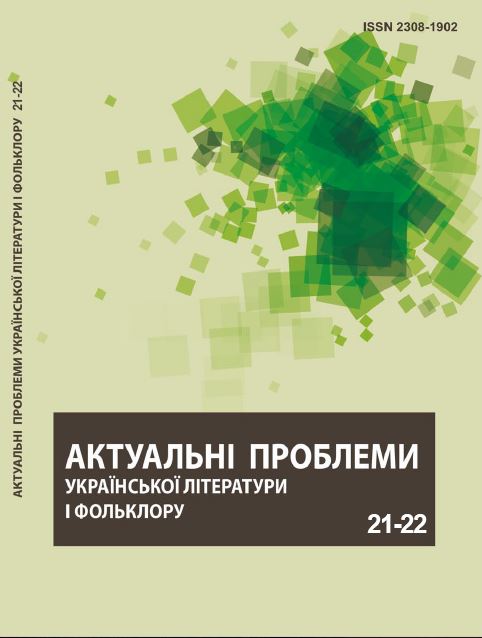Existential and stoic dimensions of lyric poetry by Vasyl Stus.
Keywords:
creative personality, discourse, narrative, lyric poetry, humanism, stoicism, existentialism, elegy and meditationAbstract
The article elucidates creative personality and individuality, character of artistic searches, discursive practice of Vasyl Stus. Lyric narrative determines poet’s historisophic visions and philosophical concepts, such as spirituality and humanism, stoicism and existentialism, life and death, good and evil. The poet reflects on the causes of national tragedy. It is stated that due to poet’s observation, the tragedy was predetermined by both the external factors (constant assaults by strangers, neighbors of Ukraine) and internal reasons: betrayal and insidious of political leaders, Hetmans, Ukrainians’ inability for self-discipline and uniting of the forces in front of the evil inclination them to strife, vengeful hardship, displacement of public interests with personal ones, selfish, mercantile desires and aspirations. V. Stus’s hero resigns national leaders as ones who sought support in the East, the West, but not in their own people. The range of feelings „prison lyrics” by V. Stus is very wide: from frustration, hopelessness, despair – to the optimistic expectations of a better fate, belief in the immortality of their homeland. The lyrical hero lives in two time dimensions: past and present, in the memories and bitter realities of today. Lyrical story of many works is based according to this principle. The antithesis is often compositional factor of poems written in exile. Aching pain permeated his poetry, which is based on contrasting scenes, magical dream-memories opposed to harsh reality. The author of the article outlined the subject and problems of lyric poetry of the poet, his genre repertoire, new type of hero-existential, uniting in itself traits of Antaeus, Orpheus and Prometheus.References
Дзюба І. М. Різьбяр власного духу (Василь Стус) // З криниці літ : у 3 т. – Т. 3. / Іван Дзюба. – К. : Вид дім „Києво-Могилянська академія”, 2007. – С. 602–628.
Колодкевич Г. В. Варіативність поетичного мислення В. Стуса в культурно-духовному просторі ХХ ст.: автореф. на здоб. наук. ступ. канд. філол. наук: 10.01.01 – українська література / Г. В. Колодкевич. – К., 2013. – 17 с.
Коцюбинська М. Василь Стус у контексті сьогоднішньої культурної ситуації / Михайлина Коцюбинська // Слово і час. – 1998 – № 6. – С. 17–21.
Коцюбинська М. Поет / Михайлина Коцюбинська // Стус В. Твори : в 4 т. – Львів : Видав. спілка „Просвіта”, 1994. – Т. 1, кн. 1. – С. 7–39.
Стус В. Твори: в 4 т. / Василь Стус. – Львів: Просвіта, 1994. – Т. 1, Кн. 2. – 431 с.
Стус В. Твори: в 4 т. / Василь Стус – Львів: Просвіта, 1995. – Т. 1., Кн. 1 – 431 с.
Стус В. Твори: в 4 т. / Василь Стус. – Львів: Просвіта, 1999. – Т. 2. – 429 с.
Стус В. Твори: в 4 т. / Василь Стус. – Львів: Просвіта, 1999. – Т. 3, Кн. 1. – 486 с.
Стус В. Твори: в 4 т. / Василь Стус. – Львів: Просвіта, 1999. – Т. 3., Кн. 2. – 495 с.
Стус Василь : Життєві і творчі контексти. Матеріали ІV Всеукраїнської наукової конференції // Актуальні проблеми української літератури і фольклору. Вип. 12. – Донецьк : Норд-Прес, 2008 – 458 с.
Шевельов Ю. Трунок і трутизна (Про „Палімпсести” Василя Стуса) [Текст] // Шевельов Ю. Вибрані праці. Літературознавство / упоряд. І. Дзюба: в 2 кн. – Кн. 2 – К. : Вид. дім „Києво-Могилянська академія”, 2008. – 1151 с.
Шевченко Т. Пов. зібр. творів: у 12 т. / Тарас Шевченко. – К.: Наукова думка, 1990. –Т. 2. – 588 с.

